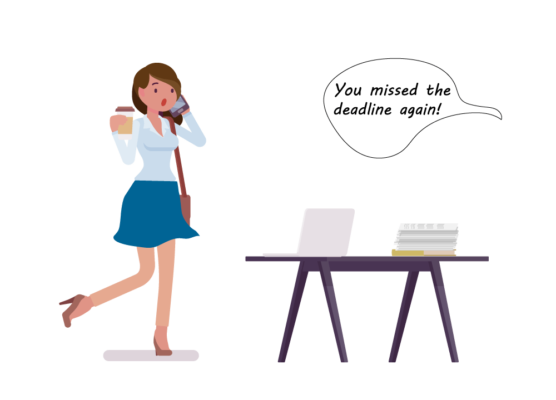90 sample phrases for negative performance reviews
Turning negative feedback into growth
Writing performance reviews probably isn’t the aspect of your job you look forward to the most. The process can become tedious and daunting when you must write negative performance reviews.
While no one likes to be the bearer of bad news, it’s necessary for employee growth and development. A Zenger and Folkman study found that 92% of respondents agree that “negative feedback if delivered appropriately, is effective at improving performance.”
Here is a list of performance 90 sample phrases for negative performance reviews separated into nine categories. You can use this list to help you the next time you write a review that needs negative feedback.

Attendance and Punctuality
- She is frequently late to work.
- She responds to communication outside of the expected time frame.
- She often runs behind schedule, negatively impacting the workday flow.
- Her tardiness does not meet attendance standards for punctuality.
- She is regularly late, returning from lunch and breaks.
- Her frequent absences are impacting reliability.
- She is rarely on time.
- She does not meet the attendance policy standards despite frequent warnings.
- She needs to improve her time management skills.
- She does not respect others’ time and responsibilities.
Communication
- She has trouble communicating effectively in groups.
- She needs to work on communication skills.
- She uses derogatory language when communicating with co-workers.
- She communicates condescendingly when asked for assistance.
- She needs to improve written and verbal communication.
- Frequent meetings have not proven to be an effective way to communicate with their employees.
- She fails to alert proper personnel regarding essential issues.
- She does not voice opinions or ideas during team meetings.
- She should provide frequent updates on projects to maintain open communication.
- Her message is frequently misunderstood due to a lack of proper communication skills.
Cooperation
- She excels when working individually but struggles to complete group tasks and projects.
- She fails to be an effective team member.
- She does not offer assistance to others in the office.
- She does not demonstrate the desire to work in a team environment.
- She avoids working with others when possible.
- She fails to share important project-related information with the team.
- She is unwilling to ask for help when needed.
- She does not communicate with other employees.
- She appears to be distant and standoffish.
- Poor communication leads to ineffective team meetings.
Professionalism
- She struggles to develop professional relationships.
- She fails to differentiate between personal and professional relationships.
- She demonstrates unprofessional behavior while on work grounds.
- She displays prejudices that interfere with maintaining a positive work environment.
- She fails to engage in professional development opportunities.
- She fails to attempt to improve job performance.
- She does not ensure work meets performance standards.
- She does not perform the required duties.
- She violates the company’s code of conduct and code of ethics.
- Her personal problems are negatively impacting her job performance.
Leadership
- She will benefit from leadership training to improve this skill.
- She struggles to accept constructive criticism.
- Her mannerisms don’t encourage the team to feel comfortable communicating openly.
- She does not lead by example.
- She is encouraged to attempt to develop solutions before asking for help.
- Her inconsistent guidance is confusing to employees.
- She fails to properly communicate rules, procedures, and messages to subordinates.
- She cannot make on-the-spot decisions when required.
- She fails to provide staff with positive feedback or acknowledgment of a well-done job.
- She micromanages staff.
Creativity
- She is not open to new ideas and perspectives.
- She discourages creative solutions.
- Being more flexible would be beneficial to the company.
- She rarely generates new ideas.
- She is not willing to accept change.
- She will benefit from being more resourceful.
- She discourages taking risks.
- She is unwilling to adapt to new situations and circumstances.
- She has creative ideas but is unable to bring them to life.
- She overlooks employees with innovative ideas.
Customer Satisfaction
- She violates the company ethics policy when communicating with customers.
- She sticks to a rigid script when communicating with customers.
- Her average call time is too long. She needs to deal with customer issues more efficiently to reduce call time.
- She needs to improve customer support on the phone.
- She needs to improve her face-to-face customer support.
- She should improve her listening skills when communicating with customers.
- She receives subpar ratings from customer satisfaction surveys.
- She is hesitant to address difficult customer situations.
- She becomes regularly frustrated by customers.
- She does not use opportunities to educate customers about additional products and services.
Time Management
- She should learn to manage time more effectively.
- She does not complete assignments promptly.
- She frequently misses project deadlines.
- She spends too much time on tasks not related to work during the day.
- She would benefit from time management training.
- She needs too much time to complete tasks.
- She would benefit from developing a plan to be more productive daily.
- Her inability to meet deadlines negatively impacts the team and the company.
- She is unaware of how time management deficiencies impact team members.
- She continues to miss deadlines despite frequent reminders.
Job Duties
- She lacks the knowledge to complete job duties.
- She is not as knowledgeable about job-related tasks as expected.
- She submits sub-par work due to a lack of job-related skills.
- She frequently seeks support and assistance from team members due to a lack of job-related skills.
- She does not retain the information necessary to perform job duties correctly.
- She is unable to perform under office conditions.
- She requires constant supervision due to a lack of job-related knowledge.
- She lacks a basic understanding of job-related functions.
- She will benefit from professional development to improve her skill set.
- She will benefit from additional on-the-job training to improve performance.
These phrases are to be used solely as a guide to providing negative performance reviews. The most effective performance reviews are personalized and specific. Therefore, you want to personalize them as much as possible to provide the best learning opportunity for your employees.
While writing negative performance reviews is generally not enjoyable, constructive criticism can improve employee performance, which is the ultimate goal.
More Resources:
Annual performance review template ![]()
A practical guide to 360-degree performance reviews ![]()
Virtual meeting etiquette in today’s workplace ![]()
Want more insights like these? Visit Quiana Darden’s author page to explore her other articles and expertise in business management.














